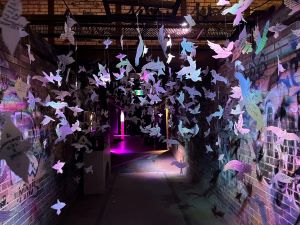Making Space for Grief: Innovate Approaches to Knowledge Mobilization Through Art, Placemaking, and Cross-Sector Dialogue
Grief—often defined as the process of coping with loss—ebbs and flows throughout our lives. Despite its universality, this deeply human experience is often constrained by cultural taboos. In Western contexts, including Canada, cultural norms tend to discourage open expressions of grief, particularly when it occurs outside the context of death. These taboos make it harder to recognize or validate grief emerging from other lived experiences, such as major transitions, relational changes, missed or lost opportunities, and systemic and structural injustices. Beyond death, grief can stem from profound and subtle losses, such as moving away from home or community, the end of a relationship, changes at work, financial challenges, or even achieving a long-sought goal. Consider the COVID-19 pandemic: for many of us, this sudden and severe disruption to daily life was, and continues to be, a source of collective grief. These experiences stir a complex mix of emotions—sadness, anger, guilt, anxiety, helplessness—that often go unacknowledged as grief, leaving us with an incomplete understanding of its broader impacts on individuals and society.
Understanding grief is critical for navigating change, including both the disruptions we have already faced and those yet to come, such as the inevitable losses, transitions, and uncertainties tied to the climate crisis. It is also an essential ingredient for futurity and for reimagining how we organize our cities and societies. By recognizing grief as a shared experience rooted in individual and systemic losses, we can cultivate empathy as a powerful tool for bridging systemic and sectoral divides and addressing the inequities we seek to resolve.
Grief and mobility
Grief and mobility injustices are deeply connected, as immobility often disrupts the ability to connect with loved ones, engage in community, and access daily life activities. A range of intersecting factors contribute to mobility barriers and inequities, including individual circumstances like aging, disability, changes in health, as well as systemic and structural inequities like poverty, racism, and automobility. These challenges are often compounded by inequitable built environments, including inadequate transportation and housing systems, which limit opportunities for safe, reliable, and affordable movement. Mobility is more than just getting from one place to another; it is a lifeline that provides access to essential services like education, healthcare, and employment, along with opportunities for social connection, cultural participation, and community engagement. When these connections are severed, individuals and communities experience isolation, fewer opportunities, and a loss of independence.
A Collaboration Sparked by Community Engagement
Recognizing the importance of grief in understanding and catalyzing change, Mobilizing Justice (MJ) partnered with Method Collective for their third installation of Space for Grief, held from November 2-11, 2024, at Evergreen Brick Works in Toronto. Space for Grief is an immersive public art and placemaking initiative reimagining how communities understand, experience, and engage with grief. The project, born from the work and insights of Method Collective founders Fran Quintero Rawlings, Ziyan Hossain, and Calla Lee, uses innovative ways to explore grief as a critical public health issue, offering a sanctuary for healing, reflection, and connection.
This collaboration grew from MJ’s community connections and engagement through its Community and Equity Advisory Table (CEAT), where member Fran Quintero Rawlings offered a unique opportunity to explore the intersection of grief and mobility. Through this initiative, MJ was able to engage in innovative knowledge mobilization and cross-sector discussions on mobility justice, grief, and equity.
Space for Grief invited visitors to explore thought-provoking prompts set among remnants of industrial machinery and organic plant materials. The indoor and outdoor elements wove together a space for individual and collective reflection. As part of the interactive experience, visitors wrote personal messages on paper birds and hung them, sharing their stories and memories of grief. These messages formed a collective display that grew and evolved as more contributions were added.

Image description: A narrow hallway with exposed brick walls covered in graffiti features hundreds of suspended white paper birds, illuminated by soft purple and blue lighting, creating a dreamy, reflective atmosphere.
Image source: Method Collective

Image description: An industrial space with rusted machinery contrasts with white furniture, floral decor, and window lighting. People gather and interact with artifacts in this inviting, light-filled setting.
Image source: Method Collective
The partnership allowed MJ to bring its focus on mobility and equity to broader audiences through accessible and emotionally resonant public engagement. As part of the collaboration, MJ sponsored an artifact in the Museum of Grief, a central feature of Space for Grief. With over 15,000 participants, including Toronto City Mayor Olivia Chow and ongoing support and amplification from MPPs Kristyn Wong-Tam and Chris Glover, the installation offered visitors a space to reflect on grief through multi-sensory experiences such as projection-mapped visuals and custom soundscapes. MJ’s artifact, Move, a cane, underscored the relationship between mobility and grief, illustrating how restricted movement can profoundly impact emotional and social well-being. The artifact’s description also included a QR code linking visitors to our website, extending the reach of MJ’ research and resources.
“This cane, a symbol of mobility loss, reflects the inevitable changes our bodies undergo as we navigate life. It serves as a reminder that physical abilities evolve, and with these changes come new challenges. It underscores the need to create spaces and systems that accommodate varying levels of mobility”

Image description: An industrial space with white suitcases, a white bicycle, and white furniture. A white cane leans against a wooden beam, surrounded by vibrant flowers.
Image source: Method Collective

Image description:
Image source: Method Collective
Image description: A close-up of a display card titled Move attached to a metal beam. The text explains the symbolism of a white cane representing mobility loss and the need for inclusive spaces and systems. A QR code at the bottom links to Mobilizing Justice’s work on mobility justice and advocacy.
Image source: Method Collective
The collaboration also featured in the Good Mourning Festival on November 3, where MJ Director Steven Farber joined speakers from Advocacy for Respect for Cyclists, CP Planning, Toronto Shelter Network, and Canadian Grief Alliance for a panel discussion titled “Designing for People: Exploring the Role of Grief in Social and Cultural Change”. Approximately 150 people attended this cross-sector discussion, which explored how grief intersects with systemic inequities and how urban systems can better support human connection and resilience.

Image description: MJ Director Steven Farber, a man with glasses, short dark hair, and wearing a light grey, long-sleeved shirt, gestures expressively while holding a microphone during a panel discussion. Seated beside him is Fran Quintero Rawlings, a woman with short dark hair, glasses, and a black Space for Grief logo t-shirt, also holding a microphone.
Image source: Method Collective

Image description: A group of six people seated in a panel discussion within an industrial-style venue. They are positioned in a row against a brick wall with visible pipes and machinery in the background. Some of the panelists hold microphones, and one is speaking while gesturing. An audience sits on colorful chairs in the foreground, facing the panel.
Image source: Method Collective
Reflections on Innovative Forms of Knowledge Mobilization
I asked MJ Director Steven Farber about his key takeaways from the Space for Grief collaboration and his participation in the Good Mourning Festival. He shared that beginning the conversation with the idea of grief created a unique opportunity to establish a shared understanding of this universal experience and its impacts. In doing so, participants were able to connect more deeply with complex systemic issues like mobility justice on a human level.
“This collaboration allowed us to engage differently,” he noted. “Grief is a universal experience, but everyone approaches it from their own perspective. By starting there, we were able to create a space for meaningful dialogue that transcended the typical technical or policy-driven discussions.” This approach, he explained, helped ground the conversation in lived experiences and set the stage for deeper engagement.
Farber also reflected on the intersectoral nature of the collaboration, which brought together voices from housing, transportation, and advocacy sectors. “This wasn’t about focusing on tactical or technical solutions in isolation,” he explained. “The conversation was human-centred, emphasizing the shared experiences and impacts of inequitable systems on people’s lives.” He pointed out that understanding grief—whether tied to displacement, mobility barriers, or other systemic inequities—can help organizations and policymakers better address the cumulative burdens people face in navigating these challenges. He also emphasized how grief, often overlooked in planning and policymaking, could serve as a critical entry point for creating more inclusive, empathetic urban systems.
The collaboration reinforced the value community engagement and innovative knowledge mobilization approaches like public art and placemaking, which have the potential to connect research with lived experiences and inspire cross-sector solutions.
Closing Thoughts
Mobilizing Justice is grateful for the opportunity to collaborate with Method Collective and participate in the Space for Grief initiative. This partnership demonstrated the power of innovative knowledge mobilization to bridge research and lived experience, foster empathy, and inspire meaningful dialogue across sectors.
Watch, read, and listen to more coverage of the Space for Grief event at the links below:
You may also like
 Removing Fare Barriers: Free Public Transit for Youth Experiencing Homelessness in Toronto
Removing Fare Barriers: Free Public Transit for Youth Experiencing Homelessness in Toronto
Noah Kelly is the Director of Research & Partnerships at the Transit Access Project (TAP) and has recently completed his Master of Arts at McGill… Read More
 The Hidden Price of Clean Transportation
The Hidden Price of Clean Transportation
Lessons from the Transition to Electric School Buses The French version of this blog post is available HERE. Canada’s 51,000 school buses… Read More
 Youth Experiences with Active Transportation in Yellowknife, Northwest Territories, Canada
Youth Experiences with Active Transportation in Yellowknife, Northwest Territories, Canada
About the Prioritizing Populations Study Group My name is Alexandra Sbrocchi, and I am a rural planner and third-year PhD candidate in the School of… Read More